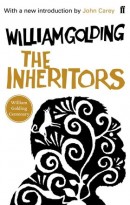 September marks the centenary of William Golding’s birth. I’ve only read Lord of the Flies, and so long ago that it only survives in my memory as a punchline for chaotic situations. (And I wouldn’t even have to have read it to know that.) Golding’s British publisher has reissued Flies, which was his first novel, and The Inheritors, his second. John Self takes a look at the less famous novel, which is told from the perspective of a group of Neanderthals:
September marks the centenary of William Golding’s birth. I’ve only read Lord of the Flies, and so long ago that it only survives in my memory as a punchline for chaotic situations. (And I wouldn’t even have to have read it to know that.) Golding’s British publisher has reissued Flies, which was his first novel, and The Inheritors, his second. John Self takes a look at the less famous novel, which is told from the perspective of a group of Neanderthals:
Evolution is the invisible character in the book, driving everything. The challenges facing the Neanderthals — finding food, returning home, getting across the river when the log they normally use goes missing — are amplified because they are not alone. Encroaching on their territory is a group of “new people,” Homo sapiens we presume. . . . There is great pathos here, as the mother of all dramatic ironies is upon us: the hopelessness of the Neanderthals’ struggles for survival in the face of the Homo sapiens, with their better tools, better communication and better planning; their habit of playing, a consequence of “leisure [and] incessant wakefulness.” Occasionally, one of the Neanderthals will strain toward an understanding of how to develop skills they don’t have — to gather more food than they need; to hold water in a shell — but it slips agonizingly away. In a sense, to review The Inheritors as a “normal” book does it a disservice. Its strength is in how it renders a world without thought as we understand it, and becomes a complete and convincing world.

